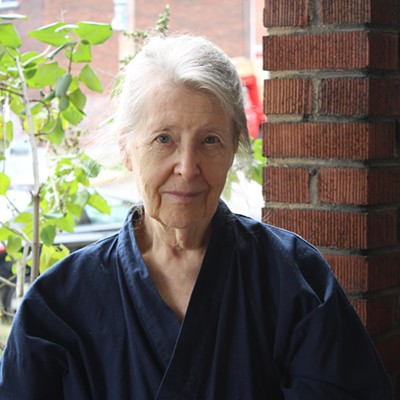Steve Johnson is fighting for the lives of young black men, and he's doing it with history and culture: words and stories from the distant and not-so-distant past.
The speaker and educator known as Steve J, 36, grew up in Wilkinsburg during years of heavy gang violence. Friends were murdered. Johnson says he was on the periphery of dangerous activity, but escaped any serious consequences through athletics.
He earned a basketball scholarship to New York's Genesee Community College. Along the way, a mentor introduced him to books about black history — not just the American civil-rights era, or slavery, but ancient Africa, where kingdoms like Kush (in what's now Sudan) existed alongside pharaonic Egypt. "Our history is much more than Martin Luther King or Malcolm X," Johnson says.
He was moved by the African idea that a person's actions are all observed by his or her ancestors. "When I learned that, it really changed me," says Johnson.
How Did I Get Here: From a Kushite to a Thug is Johnson's self-published 2011 book diagnosing troubles plaguing the black community. He cites a pervasive "thug mentality" that's not just about poverty, but also hatred, self-hatred and ignorance of the past. That mentality, he says, begets shootings of the kind that claimed his own younger brother just last year. Johnson wants to channel thug energy in a positive direction.
Locally, Johnson is known for his gang-prevention and conflict-resolution courses and talks. The West End resident has taught at schools and nonprofits, including Westinghouse High School, and Allegheny County's Community Intensive Supervision Program for adjudicated youths. The Duquesne school district praised his work as "powerful and inspiring."
Johnson ties his history lessons about African cultural strength to hip hop, opening each chapter of his book by quoting consciousness-raising rappers like Tupac, KRS One, Talib Kweli and Dead Prez.
Johnson is concerned that hip hop itself has strayed from its roots. "A lot of the young kids understand hip hop, but they don't understand where it came from," he says. "We went from Afrikaa Bambataa to Public Enemy to NWA, and now we have Gucci Mane and Waka [Flocka Flame]," adds Johnson, decrying some artists' glorification of the thug mentality.
But Johnson believes his word is getting out. For instance, up-and-coming Pittsburgh hip-hop group WuLords have acknowledged Johnson's influence.
"When you teach [young people] through hip hop, they learn, they listen," he says.














